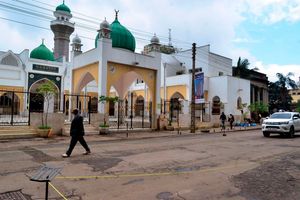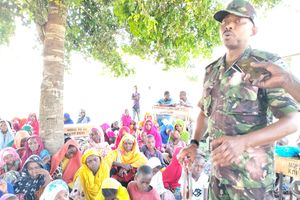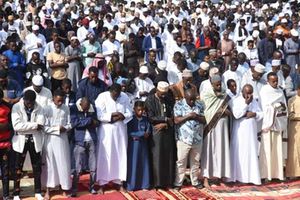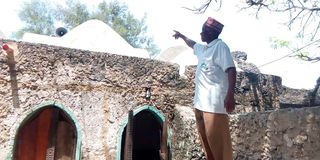
Hamisi Suleiman, caretaker, shows the design of the iconic Kongo Mosque in Diani, Kwale County.
The Muslim community has invited the Anti-Corruption agency to investigate alleged grabbing of the iconic Kongo Mosque shrine in Diani, Kwale County, by a private developer who also obtained the land’s title deed in February.
According to the group's lawyer Paul Mwangi, the Judiciary’s file containing legal proceedings where processing of the title deed originated has also disappeared from court.
The land was initially owned by the late President Daniel Arap Moi, who surrendered the title in 2009 upon learning that it had been irregularly allocated to him by the former Commissioner of Lands in 1986.
In a letter to the Ethics and Anti-Corruption Commission (EACC) chief executive officer Abdi Mohammed asking for investigations, the group says though the historic shrine sits on public land the title deed was issued to two private citizens on February 17, 2025.
Lawyer Mwangi says that early this year the land had also been advertised for sale at a price of Sh1.4 billion by the people who were granted ownership in 2005 through court proceedings. He says the mosque is a protected monument.
“The court judgment was delivered in 2005. We have attempted to peruse the file at the High Court Mombasa in which the order was allegedly made but we are told the file disappeared a few years ago,” says lawyer Mwangi in the seven-page letter sent to EACC yesterday (Tuesday). The letter indicates that the title has been issued to two people, whom we cannot name for legal reasons.
He adds: “All the facts and circumstances of this case reveal a classic Kenyan land grab, typical in style and execution, bringing together senior officers in the Ministry of Lands, the Mombasa High Court and the National Lands Commission, in a joint criminal enterprise aimed at grabbing Kongo mosque and the adjacent land”.
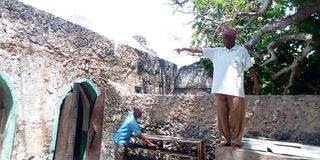
Hamisi Suleiman, caretaker, shows the design of the iconic Kongo Mosque in Diani, Kwale County.
Lawyer Mwangi argues that it was puzzling that the persons issued with the title deed are not the ones that were litigating over ownership of the land in court. The court proceedings were between Hassan Mohammed Hussein against Yusuf Kulmiye.
He further argues that the title is legally tainted and unconstitutional since the subject land has never ceased to be public and even a claim of adverse possession cannot suffice.
Narrating the history of the land, Mr Mwangi says the land had in 1986 been fraudulently allocated to the late President Daniel Arap Moi. However, the late President surrendered the title in 2009 when he learnt about it and the title was immediately cancelled.
“The government then allotted the property to the local Islamic community in Diani and appointed the Permanent Secretary of the Treasury as the trustee for Kwale Kongo Mosque and Kwale Islamic Centre to hold the property to their benefit,” he narrates.

Kongo mosque. The name was derived from a name inscribed on a stone at one of the graves in the mosque compound, where Muslim faithful Swaddiq Kongo was buried centuries ago. PHOTO | FADHILI FREDRICK | NATION MEDIA GROUP
He questions why it took 19 years (from 2005 to 2025) for the title deed to be processed.
“Incidentally, their interest is indicated as a lease of 99 years while the interest they purport to have adversely acquired from President Moi in 2005 was freehold,” says lawyer Mwangi.
Kongo shrine is Kenya's oldest mosque and was built by Persian traders in the 14th century. It has served as the Islamic Centre for neighbouring villages over the centuries and is recognized as a national monument.

